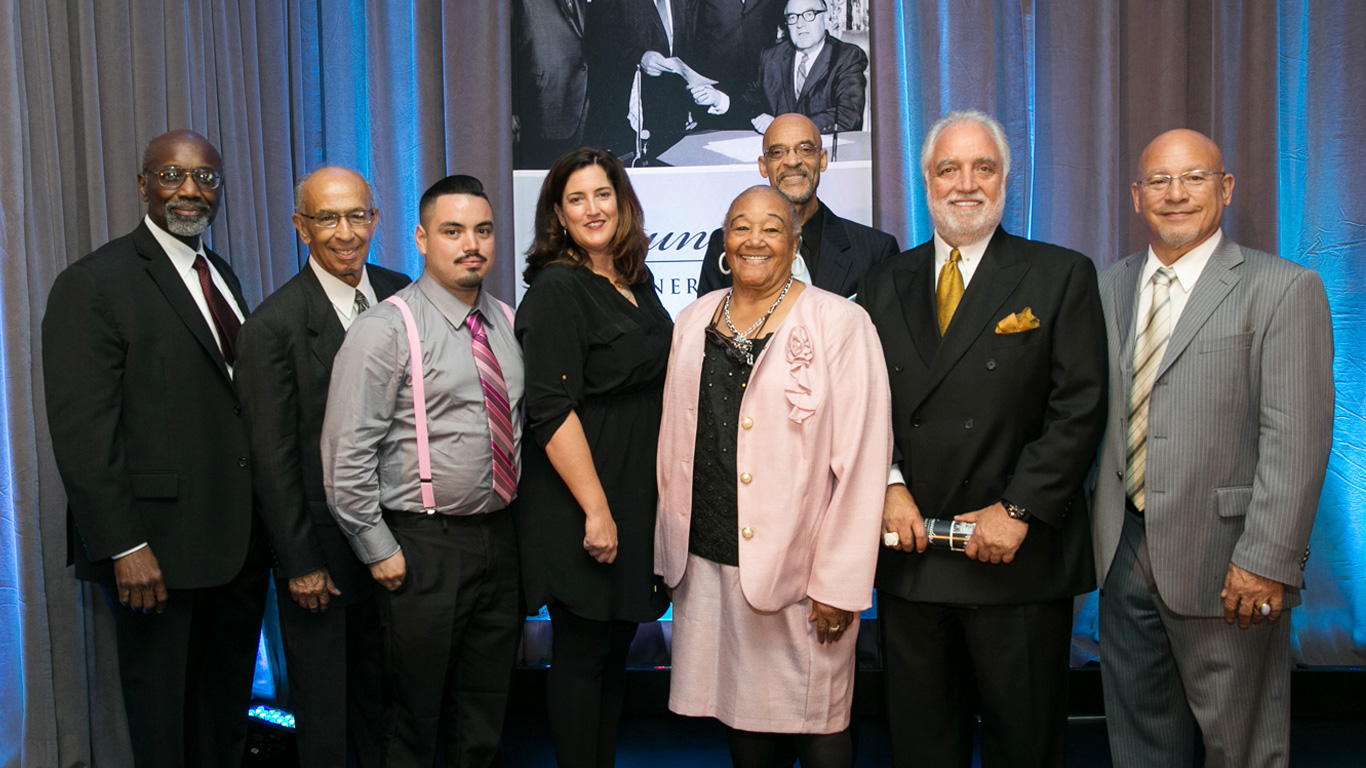With more than 350 activists, civic and business leaders, educators and friends of the university in attendance, California State University, Dominguez Hills (CSUDH) hosted its Founders’ Dinner on Oct. 8 to honor those pivotal in the in 1965 selection of what would soon become the City of Carson as the location for the university.
As the signature event in CSUDH’s year-long 50th Anniversary Watts Rebellion Commemoration–the devastating revolt that prompted the final decision to select Carson–the Founders’ Dinner also recognized those who have since worked tirelessly to help Watts residents, and those who have helped rebuild many of the South Los Angeles neighborhoods effected by the rebellion.
The honorees were:
Founders’ Awards:
Gilbert “Gil” Smith, former mayor of the City of Carson
Edmund G. “Pat” Brown, former governor of California (posthumous award)
Community Leadership Award:
“Sweet Alice” Harris, founder of the Parents of Watts
Community Impact Award:
Watts Labor Community Action Committee, which was accepted by its CEO and President Tim Watkins
Community Builder Award:
Danny Bakewell, Sr., founder of The Bakewell Company and Bakewell Media
Student Civic Engagement Award:
Pablo Portillo, a CSUDH human resources student
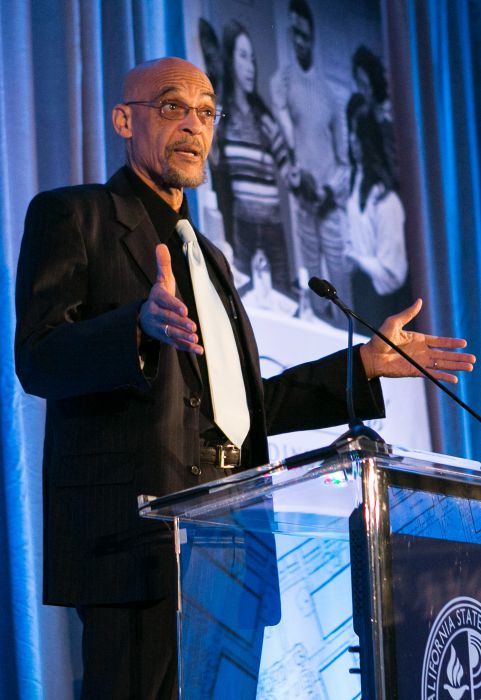
Elegantly set in CSUDH’s Loker Student Union Ballroom, the Founders’ Dinner was emceed by CSUDH alumnus Earl Ofari Hutchinson (’89, M.A. humanities), a civil rights leader, author, radio host, and political analyst. He provided a brief welcome before dinner, which preceded the evening’s program.
“Six days later, as the smoke [from the rebellion] began to clear, the true origins of the unrest glared brighter than the fires themselves,” said Hutchinson. “It was then–with momentum from the burgeoning Civil Right Movement–that the long road to positive change and a better future for Watts began to take root. In many ways, from seeds planted by those of you we are honoring tonight.”
After enjoying dinner and the soothing sounds of the Dominguez Hills Jazz Ensemble, CSUDH President Willie J. Hagan offered the formal welcome remarks to begin the Founders’ Dinner main program.
During his address, Hagan read Langston Hughes’ poem “What happens to a dream deferred?” calling it “…one of most important questions one should ask about dreams, especially dreams about our aspirations and dreams about a desired future. If you know the Watts Rebellion, you know the answer to this question. A dream deferred will explode, especially when that dream has been deferred generation after generation,” he added.
The first honoree of the evening was “Sweet Alice” Harris, a dedicated community leader and visionary who through the Parents of Watts organization she founded has committed countless hours and energy to address critical issues in Watts and improve the lives of its residents in the wake of the Watts Rebellion.
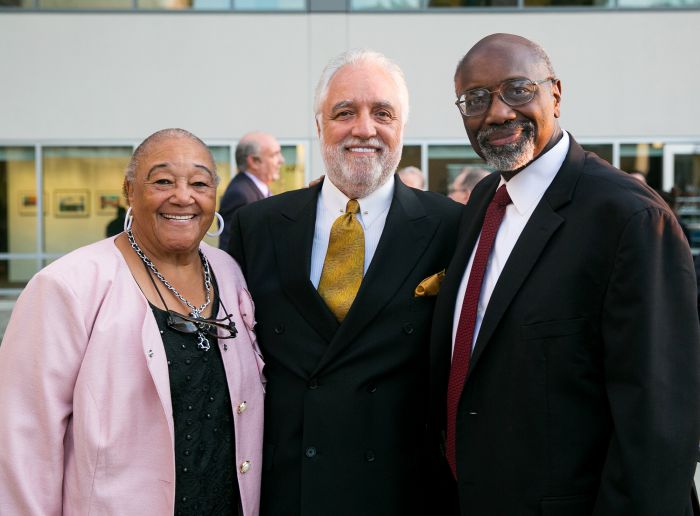
“I know how it feels to be told you ain’t nothing. You don’t want to be that way. That’s why I do the work I do,” said Harris, who experienced poverty, homelessness and single motherhood as a teenager. “We tell young people they have to go to college, and they say ‘For what? That’s not for us.’ And I say, ‘Yeah baby, that’s for you.’ … We just sent 32 young men to take the test for fire science technician in Sacramento, and all 32 passed it. That’s what I’m talking about. The key to success is giving.”
The key to success is giving. – “Sweet Alice” Harris
Following Harris, the Watts Labor Community Action Committee (WLCAC) received the Community Impact Award for “demonstrating exemplary citizenship, commitment to the community, and for its contributions over the past 50 years that have significantly and positively impacted the quality of life in the region.” The award was received by the WLCAC’s CEO and President Timothy Watkins, whose father, Ted Watkins, founded the organization in 1965 following the Watts Rebellion.
“The work of WLCAC has created an indelible imprint on American history and is an example of a community-driven organization impacting lives in spite of the many hindrances that prove insurmountable for so many,” said Watkins. “Our organization started with less than $10 and a handful of volunteers. Today we are the largest private landowner in Watts, having helped hundreds become homeowners as a top-performing human service provider in South Los Angeles.”
Bakewell, who received the Community Builder Award, is a media mogul, successful businessman, and staunch humanitarian. He owns of the Los Angeles Sentinel, the oldest and largest Black-owned newspaper on the West Coast, as well as the L.A. Watts Times and WBOK Radio in New Orleans. Bakewell is also founder of “Taste of Soul,” one of the largest street festivals in Los Angeles, which will be celebrating its 10th anniversary this week on Oct. 17.
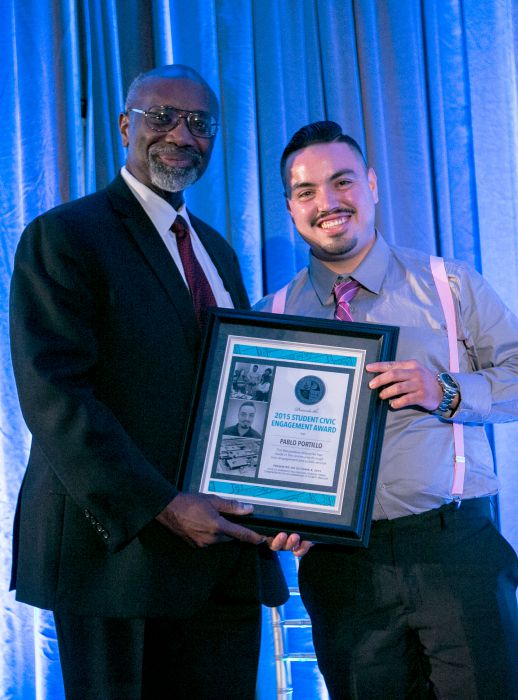
“When you do the work, you never do it to win an award. You never do it because you want to talk about ‘me.’ It’s about ‘we,’ the community, that we do the things that we do for,” said Bakewell. “Sweet Alice, Tim Watkins and his father Ted Watkins, Gil Smith–these are people who have done it against all odds. We made something out of nothing. … What we wanted to do, and what many of us have accomplished, was making sure that quality of life, particularly for black people in our community, was equal to the quality of life of all people.”
Portillo, a senior at CSUDH majoring in Human Services, was given the Student Civic Engagement Award, which honors a student who has made a substantive and positive impact on the lives of others through public service.
Portillo, who is the first in his family to attend a four-year university, currently works at the Nogales Psychological Center with individuals who have been victims of serious crimes. In August 2015 as an intern with the university’s Center for Service Learning, Internship and Civic Engagement, Portillo designed, coordinated and led a team of volunteers who planted drought-tolerant landscaping at Fire Station 65 in Watts during the “CSUDH Day of Service.”
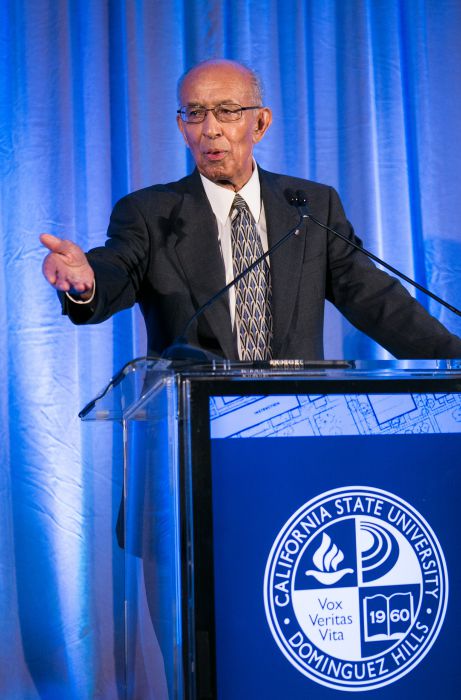
“It was here at Cal State Dominguez Hills that I learned the importance of civic engagement, and the impact is has on the community. I want to give my deepest appreciation to Cheryl McKnight (’01, B.A, anthropology; ’06, M.A., English), [director of SLICE at CSUDH,] Sergio Pineda, and Miami Gelvezon. I learned everything from them, and I will be a volunteer for the rest of my life,” said Portillo. “Even though we’re a small university, we make a huge impact on the community. The Human Services program is also small, but those who have graduated from it are professionals who are dedicated to their ambitions and their causes to help the community and those who are underserved.”
The Founders’ Awards
Smith received the first Founders’ Award during the event for his “extraordinary contribution to the university and the community.” Starting in 1963, he served as chair of the local and vocal Citizens Committee, which was a group of homeowners who got together to work toward the incorporation of the City of Carson. Included in their efforts was the development and presentation of two proposals to the then-California State College Board of Trustees to locate the university in the new city. One proposal was presented just prior to the Watts Rebellion, which is believed to have helped encourage the board to select Carson as the site for the new campus.
“It has been my privilege to work with every president of Cal State Dominguez Hills and with every chancellor of the CSU system to establish this university with an educational program relevant to the needs of a very diverse student population,” said Smith. “Cal State Dominguez Hills is an oasis located within and urban industrial environment requiring constructive communication and the interactive exchange of positive community values, hopes and information.”

The Founders’ Award was also presented to Gov. Pat Brown (posthumously), the 32nd governor of California who served two terms from 1959-1967. His award was accepted by his granddaughter, Sascha Rice, a teacher and award-winning filmmaker who produced the Emmy-nominated “California State of Mind: The Legacy of Pat Brown.”
Along with making the final decision in the selection of CSUDH’s location, Brown is credited for launching a “golden era” in the history of California through the development of the Master Plan for Higher Education, and crucial infrastructure that included new freeways and water delivery systems.
“What was so phenomenal to me was that my grandfather stayed curious. He asked about anybody he met. It didn’t matter what station in life they were in. I firmly believe the reason Cal State Dominguez Hills was moved to this spot was because he stayed curious,” said Rice. “He had a plan–the campus was going to stay in Palos Verdes–but he stayed curious. And when the Watts Rebellion happened, he didn’t say, ‘Well, we’re going to put the university over there, so that’s too bad.’ No, he thought, ‘We’re going to move this university. We’re putting it right here.’ Now that’s curiosity and openness.”
Click here for more photos.
